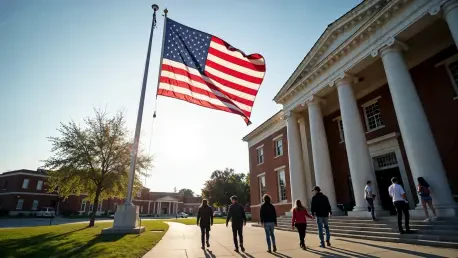The hearing conducted by the House Oversight and Government Reform Committee resonated as a significant event. This session saw Democratic governors from various blue states, namely Kathy Hochul of New York, JB Pritzker of Illinois, and Tim Walz of Minnesota, in heated discussions with Republican committee members over current immigration policies. Although planned a month earlier, the hearing gathered momentum following recent upheaval in Los Angeles and the intensified national deliberation regarding federal immigration enforcement. This scenario reflects a larger discourse across the nation involving sanctuary states and the ongoing tensions between state and federal authorities over the execution of immigration laws.
A Divided Front: Sanctuary Policies vs. Public Safety Concerns
Democratic Defenders of Sanctuary Initiatives
In the spirited discussions during the hearing, a significant focus was the stark division between Democratic governors and their Republican counterparts surrounding sanctuary policies. Democratic leaders ardently defended their states’ decisions not to fully engage with federal immigration enforcement agencies. Highlighting the intricate challenges posed by immigration policies, these governors illustrated the real-world impacts on their states. The emphasis remained on balancing public safety with humanitarian responsibilities, underlining a duty to protect vulnerable immigrant populations within their jurisdictions. Furthermore, these arguments pointed out how sanctuary policies could foster trust between law enforcement and immigrant communities, ultimately enhancing overall community safety.
The governors consistently argued that immigration complexities require a nuanced approach that transcends mere law enforcement. For instance, Governor Hochul stressed the challenges posed by sweeping immigration policies on local enforcement efforts and community harmony. These Democratic figureheads insisted that a cooperative approach rather than confrontational engagement with federal agencies would better serve their states. In response, Governor Walz highlighted Minnesota’s initiatives that focus on integration and community building. He argued for the necessity of policies that reflect local needs and demographics, adding that the blanket application of federal mandates could inadvertently harm community relations.
Republicans Questioning Sanctuary Policies
On the opposite side, Republican committee members seized the opportunity to scrutinize sanctuary policies aggressively. They summoned examples of crimes committed by undocumented immigrants as evidence of potential threats to public safety. This approach aimed to rally public sentiment, suggesting that sanctuary policies might undermine the safety and security of citizens. Several committee members questioned the prioritization of undocumented immigrants over law-abiding citizens, framing this as a central issue needing rectification. These discourses aimed to challenge the governors’ arguments comprehensively, underlining Republican legislative agendas against liberal immigration stances.
These cross-examinations were spearheaded by Oversight Committee Chair James Comer and other focal Republicans, who wanted answers to pressing questions on the governors’ policy choices. The approach often included probing into the relationship between these governors and federal authorities, using this to critique their immigration stances. The hearings saw Representative Elise Stefanik confront Governor Hochul on crime correlations linked to undocumented individuals in New York. Representative Mike Lawler’s questions echoed similar concerns, adding another layer of Republican criticism targeting sanctuary policy inadequacies.
Heated Exchanges and Political Undertones
Navigating Political Tensions and Blame
The tension-riddled atmosphere of the hearing was further intensified by emotionally charged exchanges. Republicans framed their inquiries with pointed criticisms, while Democratic governors appeared poised to refute claims while articulating their policy missions. This led to heated interactions that occasionally veered from structured debate into more personal confrontations, manifesting the deeply partisan politics influencing immigration discussions. These exchanges often served dual purposes, both as a platform for policy representation and as opportunities for political one-upmanship, with eye-catching soundbites designed for public consumption.
Governor Pritzker’s exchanges illustrated such dynamics, notably with Representative Mary Miller challenging Pritzker’s law enforcement approach in Illinois. Pritzker’s rebuttals frequently referred back to the lawmakers’ controversial remarks and historical political stances, pivoting the discussion to broader political issues. Similarly, when Governor Walz was probed regarding President Biden’s cognitive capabilities during past elections, he methodically redirected focus toward substantive policy discourse, reflecting strategic communication maneuvering inherent in such hearings.
The Broader Context of Political Discourse
While immigration remained the official topic, the hearing exposed broader political disputes, often devolving into strategic grandstanding centered around future elections. The layers of political positioning became increasingly apparent as legislators used the platform to solidify their standing on immigration before constituents and party members. This strategic edge underscored the complexities faced in forging bipartisan consensus on immigration, a topic inherently entrenched with social, economic, and ethical dimensions. The hearing became a microcosm for viewing the intricate interplay of state-federal relations, highlighting individual policy standpoints, and future political aspirations.
The tension uncovered during this discussion emphasized how intertwined immigration alone is with cultural identity and societal values. It became evident that the dialogue was not solely about laws or enforcement but rather about what policies say about the United States as a nation. Governors argued maintaining human rights and social welfare would propel civil harmony, countering allegations of undermining federal authority. Yet, the disagreement suggests ongoing contention as policymakers blaze their unique paths within their political ecosystems, making future discourse far from straightforward.
Strained Relationships and Future Considerations
The House Oversight and Government Reform Committee’s recent hearing emerged as a pivotal event, highlighting significant tensions over immigration policies. Democratic governors from key blue states, including New York’s Kathy Hochul, Illinois’ JB Pritzker, and Minnesota’s Tim Walz, engaged in intense exchanges with Republican committee members about current immigration approaches. Although this hearing was scheduled a month in advance, it gained substantial traction following recent unrest in Los Angeles and the heightened national debate on federal immigration enforcement practices. The discussions underscored a broader national conversation concerning sanctuary states, revealing the ongoing friction between state and federal governments over the management of immigration laws. This reflects a crucial aspect of the national immigration discourse, illustrating the complex dynamics at play as both state and federal authorities grapple with the execution and reform of immigration procedures, a topic that continues to polarize opinions across the United States.









